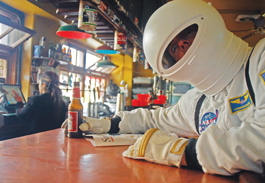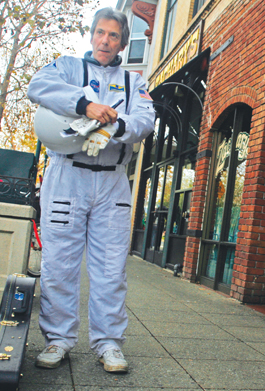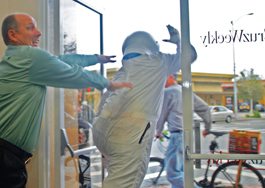home | metro santa cruz index | features | santa cruz | feature story

Photograph by Curtis Cartier
Tired of Tang: The creative force behind 'The Planet Cruz Comedy Hour' tends to basic spaceman needs.
Close Encounters
Two years ago Planet Cruz launched into orbit. Today it's a standing-room-only party with fans at the ends of the earth. Comedian Richard Stockton explains how his spaceship landed here and why it's parked--for now.
By Jessica Lussenhop
AT THE SECOND show of the third season of Planet Cruz at Kuumbwa, there is a little handwritten sign taped to the door--"SOLD OUT." The patience of the ushers is running thin as they try to herd stragglers into the back of the theater--standing room only. The lights go down. A volley of sound effects, like those in a Tex Avery cartoon, fill the air--lasers, and the mee-mee-mew of a spacecraft. "Welcome," croons a familiar voice, "to Planet Croooz." The crowd goes wild.
Planet Cruz's format--a bevy of special guest star comics and talent acts interspersed with sketches, music and standup--is a tried and true one, a kind of vaudeville. But it's when show creator Richard Stockton comes out and hits a couple folksy chords on his guitar and croons the latest installment of his ongoing comical love ballad to Santa Cruz that the audience really starts lapping it up. "Women belly dance, the babies belly crawl, the men at work sit on the big yoga balls," he sings. "This is the place where we don't experiment with drugs--we know exactly what we're doing." The crowd roars approvingly.
When he's not onstage, Stockton quietly slips into the packed audience and stands to stage right, watching his own show, as if examining it. The tone of the production may be light and airy fun, but as a concept Stockton takes it all very seriously.
"I don't like to turn people away," he says of his show's tendency to sell out the theater. "I would rather do it for free and make money off the broadcast. But we live off the support of each one of those dear, dear audience members that buys a $20 ticket."
How do you retell a good storyteller's story? Some things just don't come through on the page, like the inherent trustworthiness of his face, the effortless wave of his gray hair. When Stockton spins the tale of how he came to Santa Cruz for good six years ago, he throws off juicy tangential tidbits as he goes--"I've got an FBI file. You can check it out," or "I wanted to go to the Canyonlands and discover a new religion, instead I walked into a hardware store and fell in love"--and it's hard to resist the temptation to chase after those crumbs, and get lost in the woods of Stockton lore. And then there's the voice, which gets very low and soft when he's excited. Then it lilts and takes on a honeyed Southern twang in the middle of a good yarn, a little like he's lazily jiggling the hook he already knows is sunk. Listening to him can sometimes feel like slowly falling. He's in full control and you're just along for the ride.
But in spite of the various patois in his repertoire, Stockton's a California boy, born and raised. "When I feel romantic I have a bit of a Southern accent," he admits. "I was raised in Bakersfield and Sacramento. I even sang about it the other night: 'I was a feral child, raised by Republicans, and I came to Santa Cruz and my spirit healed.'"
His parents, whom he loves dearly, were levelheaded farm folk unprepared for the nomadic singer/songwriter/vaudevillian that their son turned out to be. "I'm definitely the black sheep," he says. "I had to go. The world called and there was a lot of music going on and I was deep into folk music."
The more free-spirited UC system of the 1960s permitted Stockton to bounce from UCLA to Berkeley to Santa Cruz, but he dropped out short of earning his diploma to answer his wanderlust. With a guitar on his back, he hitchhiked across 48 states, all the Canadian provinces, down to South America and eventually across Europe, including a month dressed as a cowboy and playing guitar on the streets of Istanbul.
Some of his fondest memories are the six years he cooled his heels in Madison County, N.C. "These people had preserved their culture for 300 years," he says. "I became one of them. Hippies and hillbillies really get along. I played their music, I fought 'em and slept with 'em and buried their dead."
Though the native crop was tobacco, and their native intoxicant was moonshine, Stockton says he brought a very special import from California. "I kept the weed thing very quiet, because it was a felony to even have it," he says. "This one guy Poppy, he just looked like an old Cherokee Indian. One night we're sitting around, it's late, we're making wine. He goes, 'Let me try one of those mary-witters, or whatever you call 'em.' The next time he came up to the cabin he had four of his friends with him. We had a little meeting, I said, 'Here's a bag of seed, guys.' If you go back now, it's one of the biggest producers in North America of marijuana."
Gift of Gab
Stockton attributes the Southern accent to his radio days in the early 1980s at WKDA/KDF in Nashville, Tenn. He said he moved there from Guatemala convinced he was going to become the next country sensation. "I'm not Willy Nelson, but I thought I was going to be in Nashville," he says. "Then I needed to make a living, and someone said, 'You talk really well, why don't you become a DJ?' So I used a name my mom actually called me, Dicky Bob. I started being Dicky Bob on the air." (Fans of Planet Cruz will remember Dicky Bob as the banjo-playing, rhyme-spitting alter ego Stockton breaks out at least once per show with the Planetoid Band: "I just think it's time for the baby-boomer-gangster-banjo-player to represent, y'all! I'm just gonna break you off a little sumpin'-sumpin' like this," he drawls.)
After getting fired from his DJ spot, he landed himself a three-day trial as a morning talk show host at WKDA in Nashville. "Shortly before, Planned Parenthood had been blown up by the pro-life movement there. Nashville was at once cosmopolitan and deeply regressive-Southern conservative," he says. "I was adamantly pro-choice. So I called up someone from the pro-life movement and said, 'I will have you on my radio show on KDA tomorrow.' We got on the air, it was a three-hour show, and we started talking and I thought this guy was going to hit me." As the three hours crawled on, Stockton says the parking lot filled with a rowdy crowd of pro-lifers, pro-choicers and police, and the phones began jangling with death threats.
"After the shift, I wade through the salespeople, good old boys with alligator shoes and three-piece suits, and they're going, 'Fuck you, man, what you doing to our station?'" he says. "And I walked by the program manager's office and he said, 'Come in here. Sign a contract.' So for two years I had this talk show."
Those were just the first of many death threats and "fuck yous" in what Stockton calls the earliest days of "hot talk" radio. He invited hookers, strippers, KKK members; he broadcast live from a death row inmate's cell. But he enjoyed the status as the No. 1-rated talk show in the mid-South market for two years. "It's the most famous I've ever been," he chuckles.
Stockton says he lost the job after the competition went after him with their own hot-talk show host. "They blew us out of the water," he says. "They offered me a job, but ahhh. I'd done it."
Meanwhile, another medium was calling. "I was sneaking down to Zanies comedy club on Tuesday nights and doing their open mic," he says. The comedy bug bit--hard. "It's like vaudeville. I always thought I was born 40 years too late. It's as close to vaudeville you can get. You can do anything as long as you can make 'em laugh four times a minute," he says. "Jan. 1, 1986, I decided I was a comedian."

Photograph by Curtis Cartier
The Gloves Come Off: Richard Stockton gets ready to open up a can of banjo whoop-ass on downtown Santa Cruz.
Funny Business
Stockton spent most of the late '80s on the comedy circuit in San Francisco. It was a time, he says, when you could get onstage five times in one night if you were diligent enough, and he rubbed elbows with Dana Carvey and Margaret Cho. He took any and all classes--acting, singing, comedy--and played a character onstage, an "altered-state-of-mind guy who doesn't quite get the joke."
As his star slowly rose, his personal life took a tumble. While he began touring the country headlining, his wife got fed up with his time on the road, although Stockton says their two kids got the best education money couldn't buy. "They loved it. They'd set them up in a booth and the Shirley Temples would keep coming," he says. "The best thing I ever did is become a father."
The late '90s saw the resurrection of Dicky Bob as he exists in his current incarnation--a baby-boomer-gangster that played very well with black audiences. He was picked up by Black Entertainment Television while it was still privately owned and played "the white guy" in a sketch comedy show. "I was always getting held up or ripped off or beat up. It was a dream," he says. "Then Viacom bought it and everyone got fired."
But one man's folly is Santa Cruz's fortune. At around this time, Stockton wrote his book, Fondle the Fear, a satirical take on "reframing."
"While trying to promote it, I came to Santa Cruz and played Gateways Books," he says. "About 7 o'clock, I get there and it's packed. I go, 'Oh, man, did they get the date wrong? What the hell?' So I'm trying to get in, and I go, 'What's going on here tonight?' and they say, 'Oh, Richard Stockton is here.' And I go, 'What?' I hadn't been able to draw flies. So I get up onstage and say, 'What are you people doing here?'" It was love at first sell-out crowd. "From that point forward, I just thought, 'You know what? Santa Cruz--I get them, they get me," he says.

Photograph by Curtis Cartier
Space Invader: Suspected of harboring Martian viruses and having been asked repeatedly not to sing Bee Gees songs, the Spaceman is 86'd from Santa Cruz Weekly.
Birth of a Planet
As Stockton's divorce became final, so did his decision to make Santa Cruz his permanent home. KUSP general manager Terry Green heard a couple of pitches from Stockton before approving a "comedy variety show about Santa Cruz."
"Sven Davis was the first person I called," he says, referring to his sound effects man. He also called Ukulele Dick and the Great Morgani, and in five months had put together the first episode of The Planet Cruz Comedy Hour, which was performed before a sold-out live audience in October 2007.
"Everybody's going, 'You can only do some pot jokes,' and I said, no, no, no, this place is special. This is a community that takes responsibility for its own happiness. This place has something America needs," he says. "When they hear it, they'll get it."
But it's not just America that's getting it--the show, now in its third season, is available in podcast form on KUSP's website. That's attracted some far-flung fans, including a team of researchers in the Antarctic and a gaggle of Dubliners who wrote Stockton that they like to listen while they go drinking.
With so much attention coming in from all over, one might be tempted to worry that the siren's song of the road will someday call Stockton back. He dismisses the idea out of hand. "I'm 60 years old. I've decided that this is my base. This is my center. I've got to make money, so I have to go out on the road"--the reason the next Planet Cruz has been postponed until January--"but as long as this town wants Planet Cruz, they will get Planet Cruz. I'm not going away," he says.
That doesn't mean there aren't still big changes in the works. In the future, bite-size sections of the Planet Cruz program will be spliced into the regular broadcasts of KUSP and KPIG, and Stockton is doing a version of the show live at Don Quixote's in January. He is even mulling doing multiple shows to deal with Planet Cruz's overpopulated audience problem. He's also talking with HBO about a storytelling show idea they rejected years ago, but which is now picking up steam, in what Stockton describes as a new golden age of storytelling. "I make money telling stories. That's what people want, from the beginning of time," he says. "We love stories and that's what Planet Cruz does. And we make 'em laugh four times a minute while we do it."
Send a letter to the editor about this story.
|
|
|
|
|
|